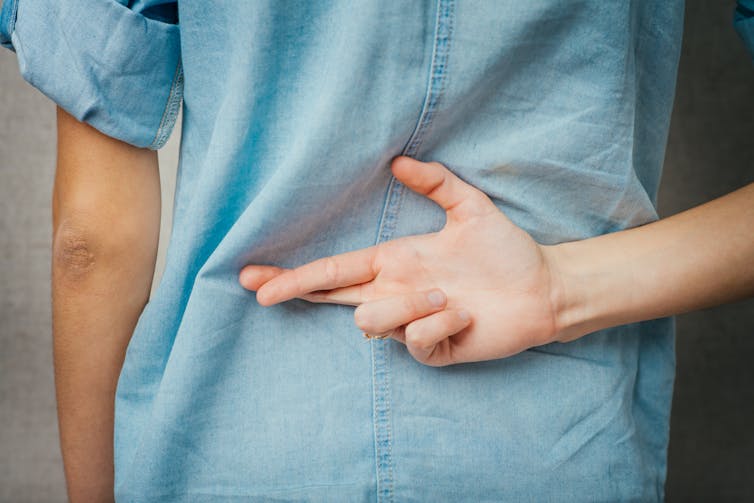You don’t have to be in the middle of an election campaign to be concerned about your ability to spot a lie. Psychology research suggests people lie at least once a day.
A 2006 review of 206 papers found that we are little better then chance at guessing whether something is a lie or not, 54% to be exact.
Some lies are told to make others feel better. I wouldn’t mind if someone wanted to tell me, “You’re such a brilliant psychologist.” Most lies however, are for the benefit of the person telling the lie.
We learn to lie young, typically between the ages of two and three. More successful lying in childhood takes a little longer and requires a more developed ability to understand others’ mental states.
You also need good working memory to be convincing, so that you can remember the lie. Brighter children seem to lie most often and most selfishly.
By adulthood we are, it seems, well practised.
There are no tell-tale signs of lying per se, but there may be indicators of negative emotion associated with telling a lie (anxiety, guilt, shame, sadness, fear of being caught) even when the liar is trying to conceal them.
These sometimes leak out in micro-expressions, brief facial expressions lasting a fraction of a second or squelched expressions where the liar covers the emotion with a mask, usually a fake smile.
You can tell a fake smile because it doesn’t involve the muscles around the eyes and leaves the face quickly. Genuine smiles fade more slowly.
But the thing about possible nonverbal indicators of deception is most of us would need to replay the behaviour in slow motion to spot them.

Facing up to the truth
But what about avoiding eye contact, believed globally to be a deception cue. My mother always said that she could tell when I was lying because I couldn’t look her in the eye. She would move closer and ask what I’d been up to the night before.
Eye contact is not a useful indicator of deception. Eye contact is affected by our cognitive activity even when we’re telling the truth. For instance, by planning our speech or accessing memory.
Also, we all know that’s what people look out for. And liars know to control it. Good liars can maintain eye contact when lying by planning their lie in advance and building their lies on fragments of the truth and real situations.
Eye contact is also affected by interpersonal distance. It’s difficult to maintain eye contact when someone is sitting close-up and staring at you (like my mother). This is the intimacy equilibrium model.
Certain behaviours signal intimacy, like distance, eye contact and topic of conversation. If interpersonal distance changes, we balance this by unconsciously moderating the others. So when my mother moved in for the interrogation, I looked away and she got the evidence she was looking for.
This is a type of confirmation bias. It’s not just that you look for evidence to confirm your hypothesis, you unconsciously influence the very behaviour you’re looking for.
This doesn’t just apply to my mother. A 1978 study suggested that police officers in interrogations move closer to suspects they think are guilty. The suspect looks away, and … guilty as charged! Observers don’t notice the changed distance.
But confirmation bias isn’t just about seating arrangement. We make instant and unconscious judgements of trustworthiness in a face quickly in everyday life (about one-tenth of a second). Once we’ve decided that someone looks trustworthy, we may unconsciously search less for cues to deceit.
Lie detection is fraught with biases and good liars know how to exploit them. They know what we’re looking out for and that’s what they control. Good eye contact, masking smile, well-prepared speech with few hesitations. They can also convince themselves of the essential truth of the lie. Self-deceit reduces any emotional response.
For my new book Lies, Lying and Liars: A Psychological Analysis I studied many expert liars and how they use our intuition against us. For example, in judging a lie we need a baseline of behaviour to detect any deviations.
Expert liars aim to disrupt this. One of my informants (with something to hide) said that when he was stopped by the police he pretended to be really angry and a bit unstable to throw them off course.
And then there’s personality. There’s no point in searching for micro-expressions of guilt, shame, sadness, or fear, if that’s not how they feel inside. Some people enjoy lying. It’s exciting, they don’t care about the consequences. Any micro-expressions in these cases will be positive.
Not a bit of wonder expert liars feel emboldened.


